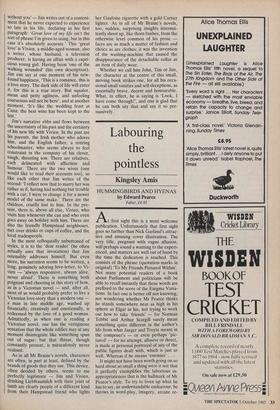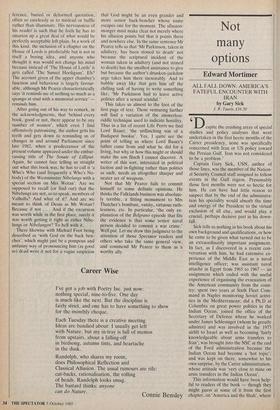Labouring the pointless
Kingsley Amis
HUMMINGBIRDS AND HYENAS by Edward Pearce
Faber, £4.95
At first sight this is a most welcome publication. Unfortunately that first sight goes no further than Nick Garland's attrac- tive and amusing cover illustration. The very title, pregnant with vague allusion, will perhaps sound a warning to the experi- enced, and matters are well out of hand by the time the dedication is reached. This consists of the phrase (quotation marks in original) `To My Friends Pictured Within'. Not many potential readers of a book about Parliament and politicians will be able to recall instantly that these words are prefixed to the score of the Enigma Varia- tions. In fact one is better off not knowing, not wondering whether Mr Pearce thinks he stands somewhere near as high in his sphere as Elgar in his, not trying to work out how to take 'friends' — for Norman Tebbit and Arthur Scargill surely mean something quite different in the author's life from what Jaeger and Troyte meant in the composer's — or even perhaps 'pic- tured' — for no attempt, allusive or direct, is made at personal portrayal of any of the public figures dealt with, which is just as well. Whereas if he means 'enemies' . . ..
It might not have been worth going on so hard about so small a thing were it not that it perfectly exemplifies the laborious in- appropriateness that is the hallmark of Mr Pearce's style. To try to liven up what he has to say, an understandable endeavour, he throws in word-play, imagery, arcane re- ference, buried or deformed quotation, often so carelessly as to mislead or baffle rather than illuminate. His nervousness of his reader is such that he feels 'he has to smarten up a great deal of what would be perfectly acceptable left plain. In a work of this kind, the inclusion of a chapter on the House of Lords is predictable but is not in itself a boring idea, and anyone who thought it was would not change his mind because instead of 'The House of Lords' it gets called 'The Sunset Hooligans'. Eh? The account given of the upper chamber's function and behaviour is largely favour- able, although Mr Pearce characteristically says 'it reminds me of nothing so much as a quango at stud with a memorial service' reminds him.
After going out of his way to remark, in the acknowledgments, that 'behind every book, good or not, there appear to be any number of women', which even 1 find offensively patronising, the author grits his teeth and gets down to reminding us of changes in and around Parliament since late 1982, when a predeccessor of the present volume appeared under the embar- rassing title of The Senate of Lilliput. Again, he cannot face telling us straight out what this book was; he has to call it 'a Who's Who (and frequently a Who's No- body) of the Westminster Nibelungs with a special section on Mrs Wotan'. Are we supposed to recall (or find out) that the Nibelungs are not, so to speak, members of Valhalla? And what of it? And are we meant to think of Denis as Mr Wotan? Because if not . . . And if the excursion was worth while in the first place, surely it was worth getting it right as either Nibe- lungs or Nibelungen? To hell with it.
There likewise with Michael Foot being described as 'with God on the back ben- ches', which might just be a pompous and unfunny way of pronouncing him (as good as) dead were it not for a vague suspicion that God might be an even grander and more senior back-bencher whose name escapes one for the moment. The allusion- monger must make clear not merely where his allusion points but that it points there and nowhere else. In the same sentence Mr Pearce tells us that 'Mr Parkinson, taken in adultery, has been stoned to death' not because the scriptural incident of the woman taken in adultery (and not stoned to death) has the smallest assistance to give but because the author's drunken-jackdaw urge takes him there inexorably. And to babble away like that gets him off the chilling task of having to write something like, 'Mr Parkinson had to leave active politics after a sexual scandal.'
This takes us almost to the foot of the first page of text. Those venturing further will find a variation of the answerless- riddle technique used to indicate hostility. Thus in a list of recent Life Peers we find Lord Bauer, 'the unflinching son of a Budapest bookie'. Yes, I quite see the point of telling us where Lord Bauer's father came from and what he did for a living, but why or how this might or should make the son flinch I cannot discover. A writer of this sort, interested in political faction and in-fighting rather than politics as such, needs an altogether sharper and neater set of weapons.
Not that Mr Pearce fails to commit himself to some definite opinions. He thinks the Falklands business was absolute- ly terrible, a fitting monument to Mrs Thatcher's bombast, vanity, virtuous ruth- lessness, etc. In particular, 'the only ex- planation of the Belgrano episode that fits the evidence is that some senior naval person decided to commit a war crime.' Well put. Let me draw this judgment to the attention of those Spectator readers and others who take the same general view, and commend Mr Pearce to them as a worthy ally.



























































 Previous page
Previous page